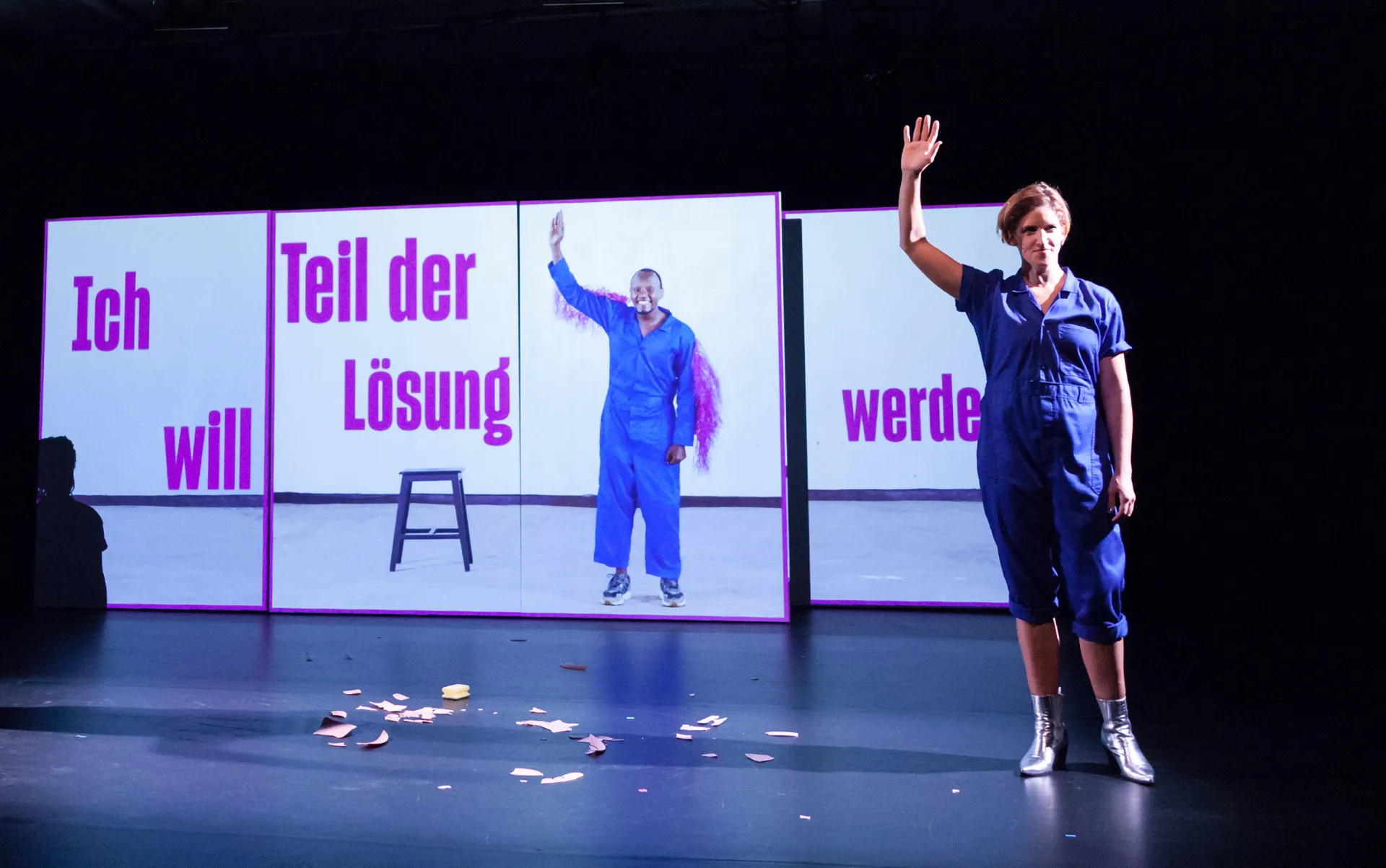Women in Europe are still fighting for what Rwanda achieved long ago: 62% of their members of parliament are female. In Germany the figure is just 34%. This East African country declared gender parity the basis of its politics in 1994. Meanwhile in Germany, this kind of parity is still a long way off despite gender equality being enshrined in common law since 1949. A Rwandan and a German performer discuss numbers and realities from both countries, using a drum as the central symbol of power. They take a peek behind the curtain: if women are empowered, how do men deal with losing their power and what are the lines of confrontation in the home? How slowly or quickly do quotas change a culture and the mindset of a nation? With speeches, statistics, songs and protest choreography, Learning Feminism from Rwanda follows the trail of Rwandan fast track feminism from shiny statistics and glass ceilings to hearth and home. Let’s see how much Europe can learn from Rwanda?
Learning Feminism from Rwanda
A Flinn Works Production in Cooperation with EANT Festival/Amizero Kompagnie
A performance by Lisa Stepf (artistic direction and performance), Sophia Stepf (artistic direction), Wesley Ruzibiza (performance and choreography), Yvette Niyomufasha, Natacha Muziramakenga (video performance) Marc Jungreithmeier (video design and scenography), Andi Otto (music), Sophia Nzayisenga (Inanga recordings), Nirere Shanel (devising and performance), Tatjana Kautsch in collaboration with Cédric Mizero, Maximilian Muhawenimana, Afriek, Ibaba Rwanda and Louise Mutabazi (costume design), Kivu Ruhorahoza (video Kigali), Susana Alonso (light design and technical direction), büro unbekannt (set construction), Annekatrin Utke (research and assistant director), Louise Mutabazi (production management Rwanda and dramaturgy), Gustavo Fijalkow (production management) / Drittmittel Produktionen and xplusdrei Produktionsbüro (tour management), Frans Katzwinkel (video technician)
Funded by Berlin Senate Department for Culture and Europe, Cultural Department of the City of Kassel, Gerhard-Fieseler-Foundation, Between Bridges
Co-produced by Theater Freiburg, Sophiensæle Berlin, Goethe-Institut Kigali, Kaserne Basel, HELLERAU – Europäisches Zentrum der Künste Dresden, Maillon Théâtre de Strasbourg – scène européenne
In co-operation with Staatstheater Kassel, Theater Tuchlaube Aarau, FFT Düsseldorf
Sophiensaele Berlin: October 29 (Opening) - November 1, 2020 / Bühne Aarau: November 11 & 12, 2020 / Kaserne Basel: November 13 & 14, 2020 / Theater Freiburg: October 7 - 9, 2021 / Staatstheater Kassel: October 20 & 21, 2021 / Pavillon Hannover: November 24 & 25, 2021 / Staatstheater Mainz: November 9 & 10, 2022 / Schlachthaustheater Bern January 13 - 16, 2023 / English Theatre Berlin: January 19 - 21, 2023
Satellite projects in Kigali, Rwanda:
Natacha Muziramakenga: Body out loud / Yvette Niyomufasha: Hafi Y'abagore / Wesley Ruzibiza: In Women's Shoes: February 18 - April 4, 2021
Precisely because it opts for an unusual perspective, this performance provides a lot to think about as well as a lot to laugh about. (...) It's wonderful that the gentlemen of occidental creation, who these days like to be depicted as "toxic white men," are invited by their Rwandan colleagues to enter the feminist coaching zone. (...) This hybrid play is a Gesamtkunstwerk.
A stunning spectacle takes place on the stage. There is drumming, numbers and statistics fly, there’s talk about quotas, sex, dispararities between cultures and salaries. "Learning Feminism from Rwanda" - it quickly becomes clear - wants to educate and it does so with drastic, striking, exciting and surprising means.
Learning Feminism from Rwanda" is an example of a smart, witty, reflective and yet determined approach to the issue of equality.
Theater der Zeit, 01/2021
